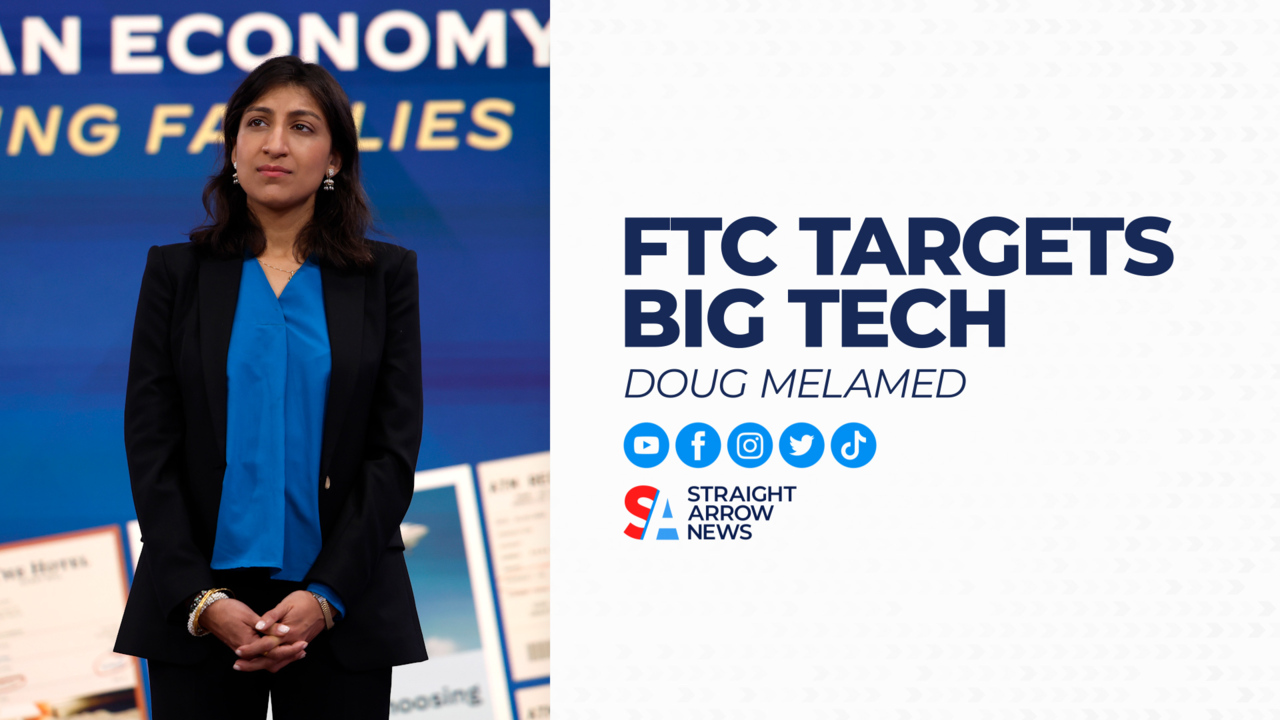
SIMONE DEL ROSARIO: THE FEDS ARE CRANKING UP THE HEAT ON BIG TECH.
THE FEDERAL TRADE COMMISSION HAS VOTED TO SUE MICROSOFT TO BLOCK ITS 69 BILLION DOLLAR ACQUISITION OF CALL OF DUTY MAKER ACTIVISION BLIZZARD.
AT THE SAME TIME, IT’S IN COURT AGAINST META TO BLOCK THE COMPANY FROM ACQUIRING FITNESS VIRTUAL REALITY STARTUP WITHIN FOR $400 MILLION. A SMALL POTATOES PURCHASE IN COMPARISON.
WE TAPPED THE SO-CALLED MICHAEL JORDAN OF ANTITRUST LAW, DOUG MELAMED, TO WALK US THROUGH THE FTC’S CASES AND WHY THE AGENCY, LED BY LINA KHAN, SEEMS MORE WILLING TO LOSE.
DOUG MELAMED: SHE HAS SAID I’M WILLING TO LOSE CASES, IF WE LOSE CASES, IT WILL BASICALLY CREATE A DEMONSTRATION TO CONGRESS THAT WE REALLY DO NEED NEW LEGISLATION. I THINK THAT’S KIND OF NUTTY. I THINK IF YOU LOSE CASES THE MOST LIKELY INFERENCE CONGRESS IS GOING TO DRAW IS EITHER YOU BROUGHT BAD CASES OR YOU DON’T KNOW HOW TO LITIGATE THEM.
SIMONE DEL ROSARIO: LET’S START WITH META AND WITHIN, WHERE THE FTC IS ARGUING A POTENTIAL COMPETITION THEORY. THE BASIS BEING IF THESE TWO COMPANIES DON’T MERGE, META WILL ENTER THE FITNESS VR SPACE ON ITS OWN AND THEN COMPETE AGAINST WITHIN.
DOUG MELAMED: THEY DON’T REALLY SAY THAT META WAS MORE LIKELY THAN NOT TO ENTER. THEY SAY THAT THERE WAS A REASONABLE PROBABILITY, IT WAS REASONABLY PROBABLE THAT META WOULD HAVE ENTERED, SUGGESTING THEY’RE ARGUING FOR A LOWER STANDARD. AND THEY DON’T SEEM TO BE RELYING ON THE KIND OF ECONOMIC ANALYSIS THAT TRADITIONALLY HAD BEEN THE BASIS OF ANTITRUST CASES IN THE PAST 40 YEARS. THEY RELY MORE ON ANECDOTAL AND IMPRESSIONISTIC STORIES. AND THAT’S WHERE I THINK THEY’RE GOING TO HAVE TROUBLE, BECAUSE THEY’RE NOT GOING TO HAVE PROBABLY THE KIND OF EVIDENCE COURTS LOOK FOR, SO IT IS A LONG SHOT. BUT IF THEY WIN, THAT WOULD BE SOMETHING NEW.
SIMONE DEL ROSARIO: AS WE’VE REPORTED BEFORE, FTC STAFF DIDN’T WANT TO PURSUE THIS CASE AGAINST META. KHAN REPORTEDLY OVERRULED THEM.
BUT MELAMED THINKS THE MICROSOFT CASE MIGHT BE AN EVEN TOUGHER MOUNTAIN TO CLIMB.
DOUG MELAMED: THIS CASE, EVEN MORE THAN THE META WITHIN CASE, IS ONE WHERE THE COMMISSION REALLY DOESN’T SEEM TO CARE ABOUT ECONOMICS AT ALL. THIS SEEMS TO BE BUILT ENTIRELY ON ANECDOTAL KIND OF STORYTELLING. I DON’T MEAN STORYTELLING BEING DERISIVE ABOUT IT, ALL GOOD LITIGATORS TELL A STORY. BUT IN ANTITRUST, TYPICALLY, YOU BACK THAT UP WITH SOME NUMBERS AND SOME RIGOROUS ECONOMIC ANALYSIS. AND THERE’S NO INDICATION IN THE COMPLAINT THAT THE COMMISSION INTENDS TO DO THAT.
SIMONE DEL ROSARIO: MELAMED WAS PRINCIPAL DEPUTY ASSISTANT ATTORNEY GENERAL AT THE JUSTICE DEPARTMENT WHEN THEY SUED MICROSOFT FOR ANTITRUST VIOLATIONS IN THE 90S… ACCUSING MICROSOFT OF TRYING TO MONOPOLIZE THE PERSONAL COMPUTER MARKET WITH WINDOWS AND INTERNET EXPLORER.
DOUG MELAMED: WE BROUGHT THE MICROSOFT CASE. AT THE TIME, IT WAS EXTREMELY CONTROVERSIAL. A LOT OF PEOPLE THOUGHT WE WERE NUTS TO BRING IT. IT TURNED OUT THE FACTS WERE BETTER EVEN THAN I THINK WE ANTICIPATED. AND WE WON THAT CASE, WE MADE SOME GOOD NEW LAW. BUT AT THE CORE, IT WAS BECAUSE WE WERE WILLING TO RUN THE RISK OF LOSING. AND I THINK THAT’S A RESPONSIBLE THING FOR A PROGRESSIVE ENFORCER TO DO TO A POINT, YOU DON’T WANT TO BE RECKLESS, BUT TO DO IT ON A POLITICAL CALCULATION THAT IT WILL PERSUADE CONGRESS TO PASS LEGISLATION, I THINK IS NUTTY.
SIMONE DEL ROSARIO: HERE’S KHAN EXPLAINING HER STRATEGY BACK IN MAY.
FTC CHAIR LINA KHAN: IF THE ANTITRUST AGENCIES LOOK AT THE MARKET THINK THAT THERE’S A LAW VIOLATION, THINK THAT YOU KNOW, THE CURRENT LAW MIGHT MAKE IT DIFFICULT TO REACH, THERE’S HUGE BENEFIT TO STILL TRYING, ESPECIALLY WITH TRYING WITH, YOU KNOW, SOME OF THE BIGGER COMPANIES SOME OF THE MORE HIGH PROFILE CASES. BECAUSE IF YOU DON’T TRY, THE MESSAGE THAT SENDS OUT TO THE WORLD IS THAT THE ENFORCERS DON’T THINK THERE’S A PROBLEM IN THE MARKET. WHEREAS IF YOU TRY, EVEN IF YOU LOSE, THAT THEN CREATES THE MESSAGE FOR CONGRESS TO KNOW, HEY, HERE, ARE THESE LAW ENFORCERS, THEY RECOGNIZE THERE’S A PROBLEM HERE, THE CURRENT LAW IS NOT ADEQUATE FOR THEM TO REACH IT. AND SO LET’S CHANGE THE LAW.
SIMONE DEL ROSARIO: AND THERE ARE LAST-DITCH EFFORTS IN CONGRESS TO PASS NEW BIPARTISAN ANTITRUST BILLS TARGETING BIG TECH BEFORE THE END OF THE YEAR. BUT WHILE THE HOUSE PASSED LEGISLATION, THE SENATE HAS SO FAR NOT PUT IT TO A VOTE.
WHICH IS PARTLY WHY MELAMED DOUBTS KHAN’S ANTITRUST STRATEGY.
DOUG MELAMED: IF THEY THINK THE COP ON THE BEAT WAS JUST ASLEEP AND DIDN’T BRING CASES THAT WOULD HAVE BEEN EASY TO WIN THEY CAN BRING THOSE CASES. BUT I DON’T SEEM TO THINK THAT’S WHAT THEY THINK. AND I DON’T SEE ANY EVIDENCE THAT THAT’S WHAT THEY’RE DOING. SO WHAT THEY’RE REALLY TRYING TO DO IS THEY’RE TRYING TO CHANGE THE LAW A LITTLE BIT, AND THAT’S OKAY, ANTITRUST LAW EVOLVES OVER TIME. THERE ARE TWO WAYS TO DO THAT. ONE IS TO BRING CASES TO PERSUADE A COURT TO CHANGE THE LAW. AND THE OTHER IS TO GET NEW LEGISLATION. I DON’T THINK THE AGENCIES HAVE DONE A VERY GOOD JOB OF EVEN BRINGING THE RIGHT KIND OF CASES TO TRY TO CHANGE THE LAW YET, AND THE FTC, I DON’T THINK HAS, FRANKLY, RETAINED THE KIND OF PEOPLE THAT I THINK ARE WELL POSITIONED TO IDENTIFY AND WIN THOSE CASES. SO WHAT I’M SAYING TODAY, I DON’T THINK THE PROGRESSIVES ARE LIKELY TO HAVE MUCH OF A LEGACY, LONG TERM LEGACY IN ANTITRUST UNLESS THEY’RE ABLE TO GET LEGISLATION THROUGH CONGRESS, WHICH DOESN’T SEEM VERY LIKELY THESE DAYS.










